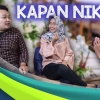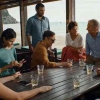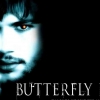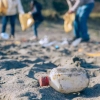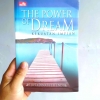“I want to have a store and do selling like mother” Siti Khorimah (girl 7 years old) whispers in soft voice. Being shy, she tries to hide her face in her mother’s lap. That is her answer when being asked what she wants to be someday. Maryani, her mother, smiles to her youngest daughter’s dream. “Indeed, my fermented soya bean cake (locally called tempe) production is increasing after I join DPO ‘Ngudi Lestari’ last year”, Maryani acknowledges. From 3 kg soya bean, she now needs 10 kg soya bean to meet the existing market demand for tempe. Beside making tempe, she also has a small store where she sells various daily households’ needs and basic commodities like rice, beans, vegetables, eggs, snacks, soap, tooth paste, and many more. Concluding her benefits, Maryani explains several entrepreneurship trainings and small stimulants that she receives from YAKKUM Rehab Center through the DPO (disabled people organization) Ngudi lestari and how it does increase her small business. Under cooperation with CBM New Zealand and New Zealand Embassy, this program is aimed at strengthening livelihood capacity of people with disability and their families and sustaining their social role in the society. This is designed based on assessed constraints faced by people with disability within their respective society. They are often marginalized from the fulfillment of basic rights such as education system and livelihood activities as they are considered lacking of abilities. It creates endless cycle of problems because such exclusion widens the gap and people with disability becomes more vulnerable and apart from the resources for increasing their capacity and accessibility in fulfilling their basic rights.
Having a child with disabilities creates a worry to Maryani. “I am sad every time Siti asks me why her face looks weird in the mirror. She likes playing outside with friends but sometimes she comes home with sad face asking why she is different, not alike her friends with normal eyes, “ Maryani goes on. Since born, her daughter is blind in one eye and has her right hand paralyzed. She has taken her daughter to various medications including traditional healer. After receiving routine massages, her hand is little bit better as it can grow normally even though it is still weak and not moveable. Now Siti is already at elementary school. She is lucky because her physical condition does not limit her to study at school.Other children with cerebral palsy in the same district where Siti lives are not as lucky as Siti.
“My wife and I are getting older and weaker. My wife cannot carry my son Wahid anymore. Wahid my son is 13 years old now and born with cerebral palsy. He cannot sit and the government’s special school for children with disabilities (Sekolah Luar Biasa) cannot accommodate him for such reason. So he is never trained to speak or to express his needs, he is only able to scream,” Maryono, 60 years old, shares his grief. “Honestly I often pray to God to let Wahid dies before me, not because I don’t love him. I only cannot imagine what will happen to him if I or my wife pass away earlier than him. He is just dependent on us,” Maryono goes on.He is member of the same DPO, located in Panjatan sub district, Kulon Progo, Yogyakarta and he is not alone. There are 7 other children with cerebral palsy in this particular DPO who are never able to go to SLB or learn how to carry out themselves, even for basic daily activities like eating.
According to UNICEF (2013), in every 20 children there is one child living with moderate and severe disability.The stories of Wahid and Siti above are representing daily challenges faced by those children. An inclusive education and health system for children with disability will ensure they have capacity to be independent human being and have productive sustainable livelihood which eventually enable them to live a full life and live it with dignity.YAKKUM Rehabilitation Center or Pusat Rehabilitasi YAKKUM works with partners, friends, DPOs and government to achieve such dream and we believe it will not remain as a dream for Siti, Maryani, Wahid and Maryono. We have to make it a reality together with them (Arshinta, April 2014)


